13 Best Herbal Teas For Menstrual Cramps
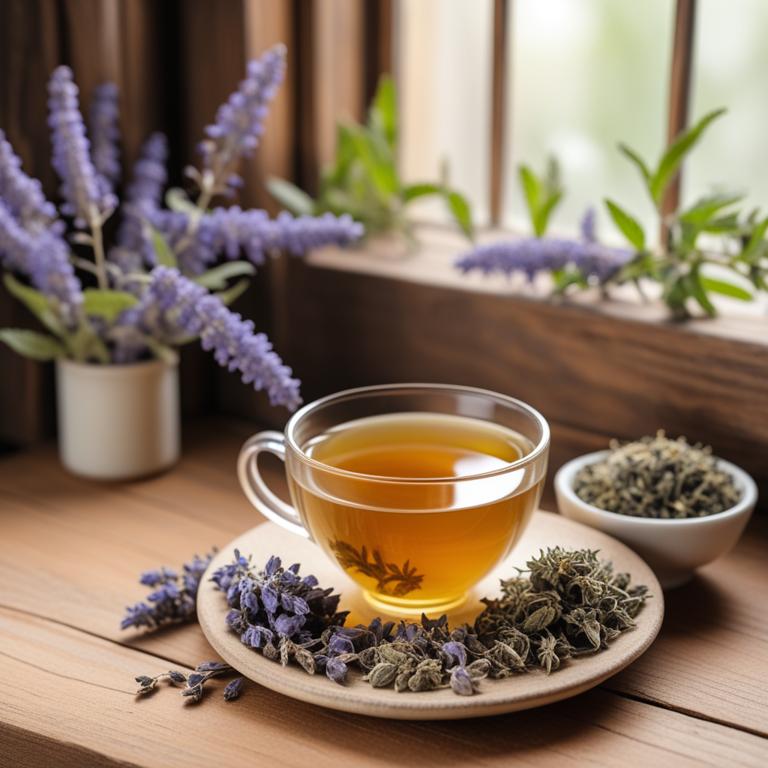
Herbal teas for Menstrual cramps are natural remedies made from various plant extracts that are used to alleviate the symptoms of menstrual cramps, which are intense lower abdominal pain and discomfort experienced by women during their menstrual cycle.
These herbal teas offer a range of benefits, including reducing pain and inflammation, regulating menstrual cycles, and promoting relaxation.
Some popular examples of herbal teas for menstrual cramps include ginger tea, which has anti-inflammatory properties that help to ease pain and reduce nausea; chamomile tea, which has a calming effect and helps to soothe the muscles; raspberry leaf tea, which helps to regulate menstrual cycles and reduce cramping; peppermint tea, which has a cooling effect and helps to ease digestive discomfort; and dandelion tea, which helps to reduce bloating and ease menstrual symptoms.
By incorporating these herbal teas into their routine, women can find natural relief from menstrual cramps and promote overall well-being.
According to the study on primary dysmenorrhoea, teas for menstrual cramps may provide relief, as many medicinal plants, including those used in teas, showed evidence of efficacy in relieving menstrual pain in at least one randomised controlled trial.
Below there's a list of the 13 best herbal teas for menstrual cramps.
- 1. Zingiber officinale teas
- 2. Valeriana officinalis teas
- 3. Camellia sinensis teas
- 4. Lavandula angustifolia teas
- 5. Vitex agnus-castus teas
- 6. Cinnamomum verum teas
- 7. Angelica archangelica teas
- 8. Melissa officinalis teas
- 9. Piper nigrum teas
- 10. Aloe barbadensis teas
- 11. Foeniculum vulgare teas
- 12. Rosmarinus officinalis teas
- 13. Artemisia absinthium teas
Also you may be interested in...
TODAY'S FREE BOUNDLE
Herb Drying Checklist + Herbal Tea Shopping List + Medicinal Herbs Flashcards
Enter you best email address below to receive this bundle (3 product valued $19.95) for FREE + exclusive access to The Aphotecary Letter.
$19.95 -> $0.00
1. Zingiber officinale teas

Zingiber officinale teas, derived from the rhizome of the ginger plant, have been used for centuries to treat menstrual cramps due to their anti-inflammatory and analgesic properties.
The bioactive constituents of Zingiber officinale, including gingerols and shogaols, help to inhibit the production of prostaglandins, which are hormone-like substances that stimulate uterine contractions and cause pain.
By reducing prostaglandin production, Zingiber officinale teas help to alleviate menstrual cramps, promoting relaxation and reducing discomfort.
The benefits of using Zingiber officinale teas to treat menstrual cramps include natural pain relief, reduced inflammation, and improved overall well-being.
Related Study
According to "Frontiers in pharmacology", Zingiber officinale teas for menstrual cramps are among the herbal medicines commonly used globally, particularly in Asia, to treat menstrual diseases, with its benefits having been observed and utilized by various ethnic groups for centuries.
2. Valeriana officinalis teas

Valeriana officinalis teas have been used traditionally to treat menstrual cramps due to their analgesic, anti-inflammatory, and antispasmodic properties.
The herbal preparation helps to treat this ailment by relaxing the uterine muscles, reducing pain and discomfort associated with menstrual cramps.
The bioactive constituents of Valeriana officinalis, including valepotriates and isovaleramide, are responsible for its analgesic and spasmolytic effects, providing relief from menstrual cramps.
The benefits of using Valeriana officinalis teas to treat menstrual cramps include reduced pain, improved mood, and a decrease in the frequency and severity of menstrual cramps.
3. Camellia sinensis teas
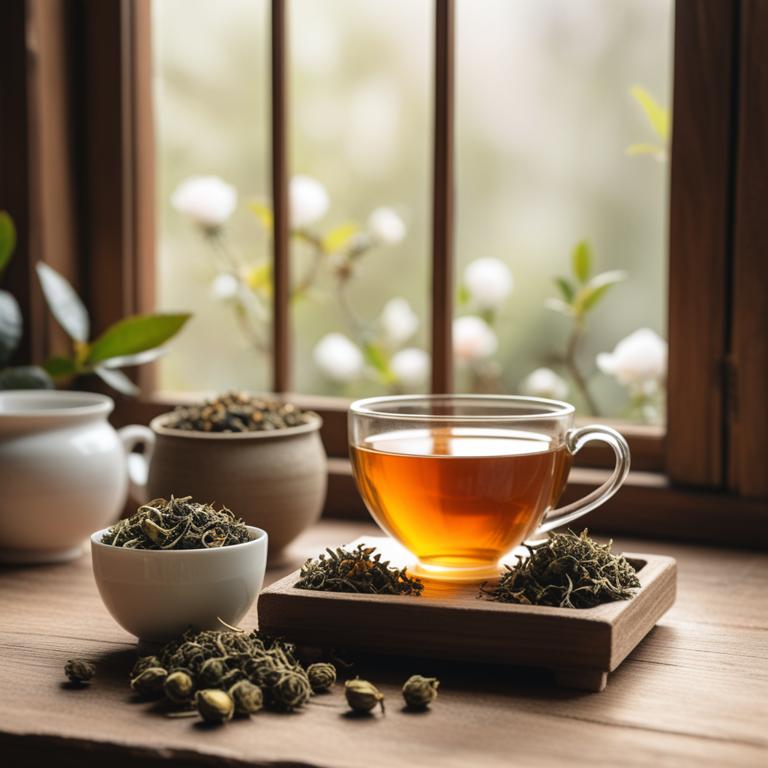
Camellia sinensis teas, which are obtained from the leaves of the Camellia sinensis plant, have been traditionally used to alleviate menstrual cramps.
The analgesic and anti-inflammatory properties of Camellia sinensis teas help to reduce menstrual cramp pain by inhibiting the release of pain-causing chemicals and reducing inflammation in the uterine muscles.
The bioactive constituents of Camellia sinensis teas, such as flavonoids, phenolic acids, and theanine, contribute to its analgesic and anti-inflammatory effects, which help to ease menstrual cramp discomfort.
Regular consumption of Camellia sinensis teas has been found to provide relief from menstrual cramps, reduce anxiety and stress, and promote overall well-being in women suffering from this condition.
4. Lavandula angustifolia teas

Lavandula angustifolia teas have been traditionally used to alleviate menstrual cramps due to their analgesic and anti-inflammatory properties.
The bioactive constituents, including linalool and linalyl acetate, help to reduce pain and inflammation by modulating the prostaglandin levels and relaxing the uterine muscles.
By consuming Lavandula angustifolia teas, individuals may experience relief from menstrual cramps, as the herbal preparation helps to promote relaxation and reduce discomfort.
The benefits of using Lavandula angustifolia teas for menstrual cramps include a natural and non-pharmacological approach to pain management, reduced anxiety and stress, and improved overall well-being.
Related Study
According to "Oxidative medicine and cellular longevity", Lavandula angustifolia teas for menstrual cramps may be beneficial due to the presence of biologically active chemical constituents, which possess significant spasmolytic effects.
5. Vitex agnus-castus teas
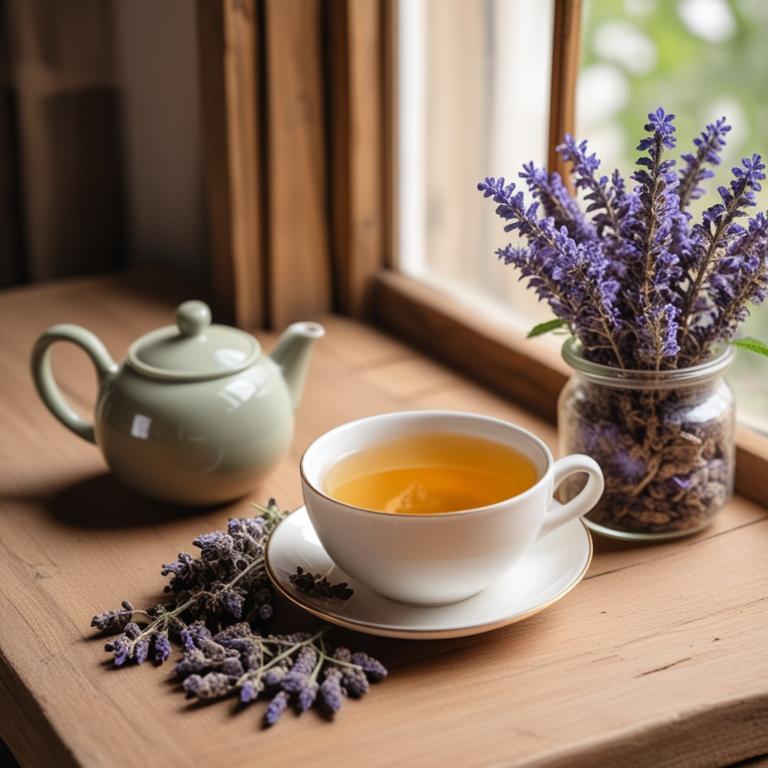
Vitex agnus-castus teas have been traditionally used to alleviate menstrual cramps due to their anti-inflammatory, antispasmodic, and estrogen-regulating properties.
The bioactive constituents of Vitex agnus-castus, such as iridoid glycosides and flavonoids, help to reduce prostaglandins, which contribute to menstrual cramp pain.
By regulating estrogen levels and reducing prostaglandin production, Vitex agnus-castus teas help to ease menstrual cramp symptoms, promoting a more comfortable and manageable menstrual experience.
The benefits of using Vitex agnus-castus teas to treat menstrual cramps include reduced pain, improved mood, and enhanced overall menstrual health.
Related Study
According to "Archives of gynecology and obstetrics", Vitex agnus-castus teas for menstrual cramps have been shown to significantly reduce symptoms in patients with pre-menstrual syndrome (PMS) by 42.5% as measured by the Moos' menstrual distress questionnaire (MMDQ), with a notable 20% difference from baseline remaining up to 3 cycles after treatment cessation.
6. Cinnamomum verum teas

Cinnamomum verum teas, also known as true cinnamon, have been traditionally used to treat menstrual cramps due to their analgesic and anti-inflammatory properties.
The bioactive constituents, such as cinnamaldehyde and cinnamic acid, found in these teas help to reduce pain and inflammation by inhibiting the production of prostaglandins, which are hormone-like substances that cause muscle contractions.
The benefits of consuming Cinnamomum verum teas to alleviate menstrual cramps include reduced pain, improved digestion, and a decrease in the severity of symptoms.
Furthermore, the antioxidant properties of these teas may also contribute to their therapeutic effects by reducing oxidative stress and promoting overall well-being.
Related Study
According to "Daru : journal of Faculty of Pharmacy, Tehran University of Medical Sciences", Cinnamomum verum teas may have beneficial effects in improving menstrual dysfunctions, including menstrual cramps, associated with PCOS.
7. Angelica archangelica teas
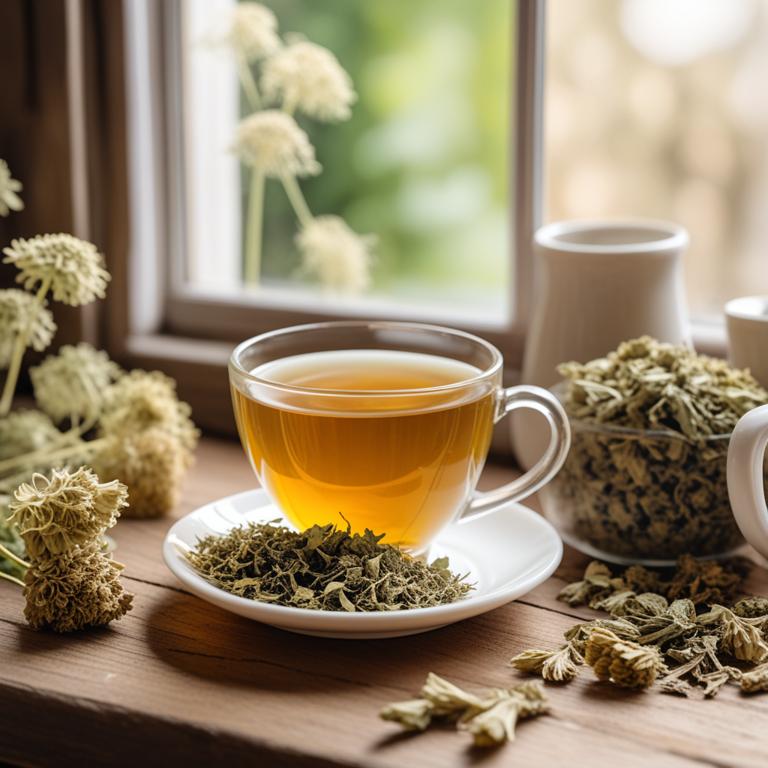
Angelica archangelica teas have been traditionally used to treat menstrual cramps due to their anti-inflammatory, antispasmodic, and analgesic properties.
The herbal preparation helps to treat menstrual cramps by relaxing the uterine muscles, reducing pain, and alleviating symptoms of discomfort.
The bioactive constituents of Angelica archangelica, including ferulic acid, sesquiterpenes, and lignans, contribute to its analgesic and anti-inflammatory effects, which help to reduce menstrual cramp severity.
The benefits of using Angelica archangelica teas to treat menstrual cramps include reduced pain and discomfort, improved menstrual cycle regularity, and enhanced overall well-being.
8. Melissa officinalis teas

Melissa officinalis teas, also known as lemon balm, have been traditionally used to treat menstrual cramps due to their anti-inflammatory, antispasmodic, and anxiolytic properties.
The bioactive constituents, including rosmarinic acid, luteolin, and apigenin, help to relax the uterine muscles and reduce cramping, while also providing relief from anxiety and stress that can exacerbate menstrual cramps.
By consuming Melissa officinalis teas, women can experience relief from menstrual cramps and discomfort, as well as improved sleep and reduced symptoms of premenstrual syndrome.
The benefits of using Melissa officinalis teas to treat menstrual cramps include a natural, non-pharmacological approach to pain management, with minimal side effects and no risk of addiction.
9. Piper nigrum teas
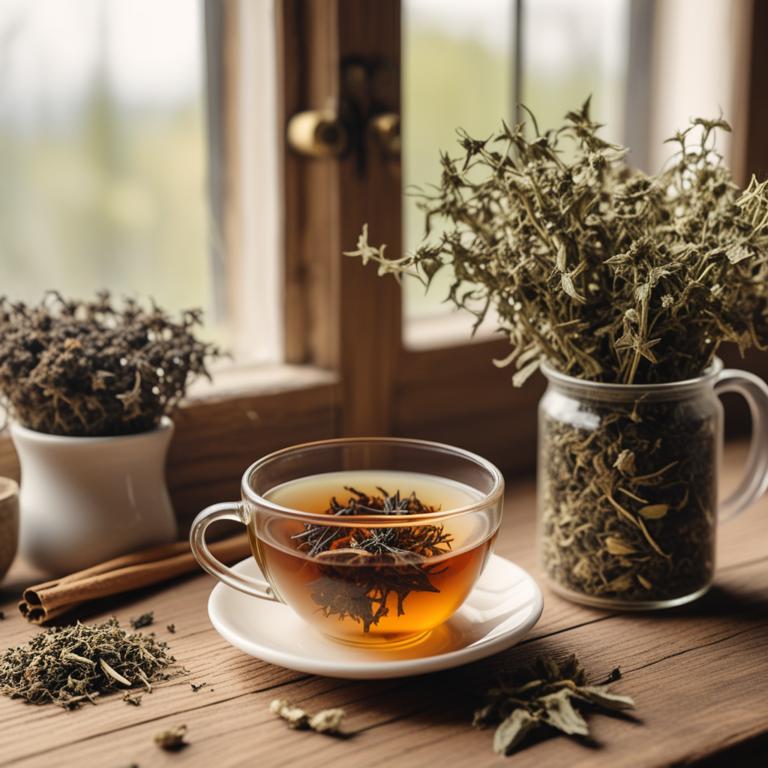
Piper nigrum teas, also known as black pepper tea, have been traditionally used to treat menstrual cramps due to their analgesic and anti-inflammatory properties.
The bioactive constituents of black pepper tea, including piperine and beta-caryophyllene, help to reduce pain and inflammation by inhibiting the production of prostaglandins and other pain-causing molecules.
By consuming black pepper tea, women may experience relief from menstrual cramps, as the herbal preparation helps to relax the uterine muscles and improve blood flow, thereby reducing discomfort and pain.
The benefits of using black pepper tea to treat menstrual cramps include its natural and non-invasive approach, making it a safe and effective alternative to conventional pain-relieving medications.
10. Aloe barbadensis teas

Aloe barbadensis teas have been used for centuries as a natural remedy to alleviate menstrual cramps due to their anti-inflammatory and antispasmodic properties.
The bioactive constituents, including aloin and aloe-emodin, help to relax the uterine muscles and reduce prostaglandin production, thereby providing relief from cramping.
Drinking Aloe barbadensis teas can help to reduce menstrual cramp severity and frequency by soothing the digestive system and promoting hormonal balance.
The benefits of using Aloe barbadensis teas to treat menstrual cramps include reduced discomfort, improved mood, and a decrease in the need for pain medication.
11. Foeniculum vulgare teas

Foeniculum vulgare teas, also known as anise tea, have been traditionally used to treat menstrual cramps due to their anti-inflammatory, antispasmodic, and estrogenic properties.
The bioactive constituents present in Foeniculum vulgare, such as anethole and limonene, help to reduce muscle spasms and inflammation, providing relief from menstrual cramps.
Drinking Foeniculum vulgare teas has been found to help alleviate menstrual cramps by relaxing uterine muscles and reducing prostaglandin levels, which contribute to pain and discomfort during menstruation.
The benefits of using Foeniculum vulgare teas for menstrual cramps include reduced pain, improved mood, and a decrease in menstrual bleeding.
Related Study
According to "International journal of gynaecology and obstetrics: the official organ of the International Federation of Gynaecology and Obstetrics", Foeniculum vulgare teas for menstrual cramps can be used as a safe and effective herbal remedy, although it may have a lower potency than mefenamic acid in the dosages used for this study, effectively relieving menstrual pain within 75 minutes of consumption.
12. Rosmarinus officinalis teas

Rosmarinus officinalis teas have been traditionally used to treat menstrual cramps due to their analgesic, anti-inflammatory, and antispasmodic properties.
These properties help to alleviate the severe pain and discomfort associated with menstrual cramps by relaxing the uterine muscles and reducing inflammation.
The bioactive constituents of Rosmarinus officinalis, including rosmarinic acid, carnosic acid, and camphor, contribute to its therapeutic effects by inhibiting the release of prostaglandins, which are chemical mediators of pain and inflammation.
Drinking Rosmarinus officinalis teas regularly has been found to provide relief from menstrual cramps, reduce the frequency and severity of episodes, and promote overall well-being during the menstrual cycle.
Related Study
According to "Evidence-based complementary and alternative medicine : eCAM", Rosmarinus officinalis teas for menstrual cramps may offer some relief due to its potent antinociceptive effects, specifically when combined with Syzygium aromaticum in a 1:1 ratio, which was shown to produce a synergistic interaction.
13. Artemisia absinthium teas
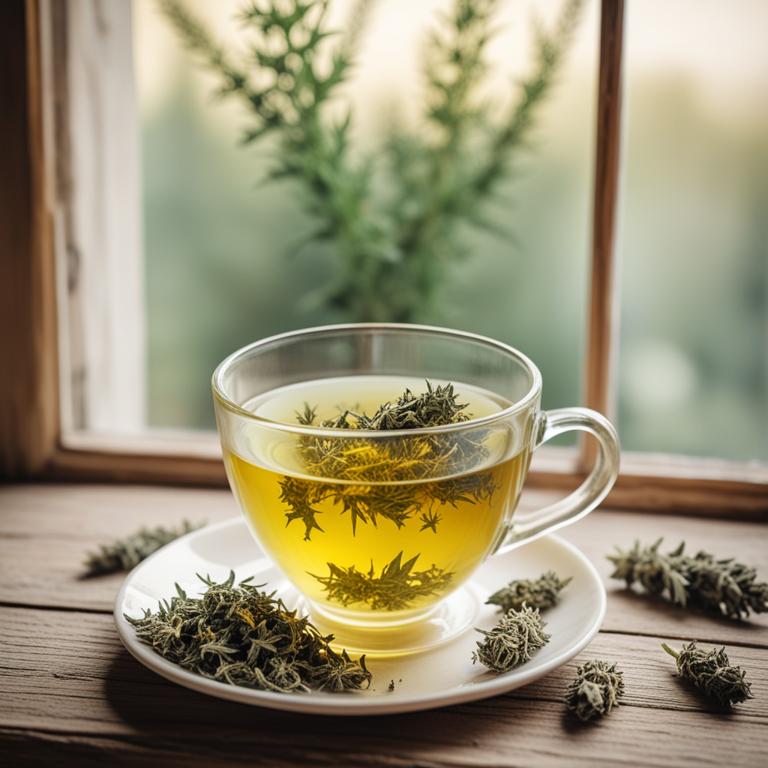
Artemisia absinthium teas have been used for centuries as a natural remedy to treat menstrual cramps due to their analgesic, anti-inflammatory, and spasmolytic properties.
The bioactive constituents present in this herbal preparation, including sesquiterpenes, flavonoids, and thujone, help to relieve pain and reduce inflammation in the uterine muscles, thereby alleviating menstrual cramps.
By relaxing the uterine muscles and reducing prostaglandin production, Artemisia absinthium teas provide effective relief from menstrual cramps, making them a beneficial natural remedy for women experiencing this condition.
Regular consumption of Artemisia absinthium teas has been shown to provide long-term benefits, including reduced menstrual pain and improved overall well-being.